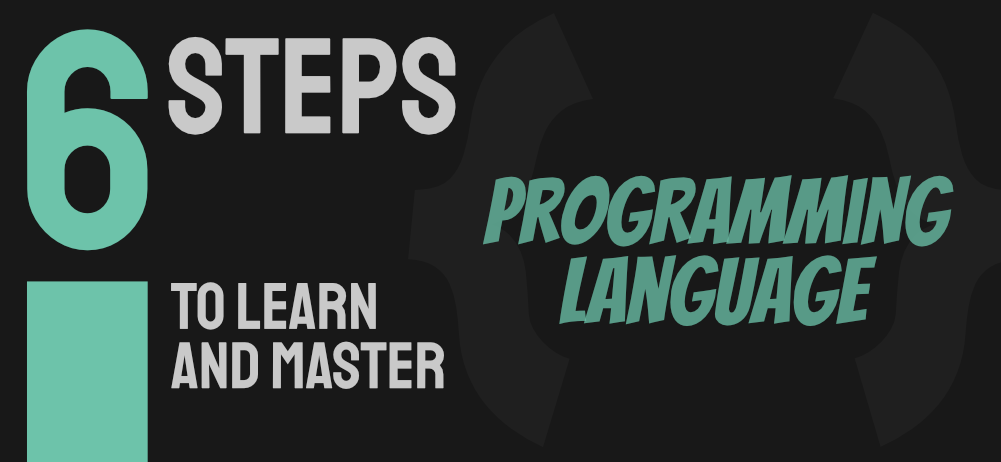6 Steps to Learn and Master a Programming Language
Last Updated :
27 Oct, 2022
Doesn’t matter if you’re a student or a working professional – a common question that generally strikes in almost every individual’s mind is ‘How to learn and master a programming language?’ People, particularly students, often struggle a lot when it comes to finding an appropriate path for learning a Programming Language. They commit numerous mistakes such as either they try it too hard and fast or just keep rendering around the basics for a long time. Some of them just don’t focus much on the basics and directly run towards the advanced concepts. But this is not going to help them in any possible way. In the end, you need to follow a proper path to hone your programming skills.

And honestly, the approach to learn and master a Programming Language is quite simple and consists of several basic steps but the problem is that many individuals ignored these aspects that make things more difficult for them.
Let’s have a look at all these steps that you need to follow to learn and master a programming language:
- Select a Programming Language as per your requirements
- Get Your Fundamentals Clear
- Move from Basics to the Advanced Level
- Practice, Practice, and Practice
- Build Minor and Major Projects
- Share your Code & Knowledge with Others
Now, let’s check all these steps in detail:
1. Select a Programming Language as Per Your requirements
First and foremost, you need to select a programming language according to your requirements as there are hundreds of popular programming languages like Python, C, C++, Java, JavaScript, PHP, Ruby, many more. For example, if you need to learn a programming language for web development, you can opt for JavaScript, PHP, etc. or if you want to learn a language to work with trending technologies like AI and ML, you can go with Python and so on. In case, if you’re a beginner, you are recommended to start with C or C++ as it will make you familiar with many underlying programming principles.
2. Get Your Fundamentals Clear
Now, you need to clear the basics of the particular language thoroughly such as its features, applications, syntax, data types, variables, text editors, etc. It can be considered as the most important process as it lays the foundation of your entire programming journey. Even our education system teaches us that first, we need to clear the basics to move to an advanced level, for example – from alphabets to essays, from counting numbers to integrations, etc. You can use various recommended books, YouTube videos, blogs, etc. to make your fundamentals strong.
3. Move from Basics to the Advanced Level
Okay, so now it’s time to dive deeper and gear up to the advanced level. You’re required to cover all the in-depth and underlying programming concepts, for instance – Pointers, Dynamic Memory Allocation, File Management & Preprocessors, etc. in C Language or OOPs concepts, Interfaces & Packages, Multithreading, etc. in case of JAVA and so on. You’re also required to command over various Data Structures such as Linked List, Stack, Queue, Heap, etc., and Algorithms in this step to become more proficient. There are numerous online platforms available over the web such as GeeksforGeeks, etc. where you can get to learn all these topics in a comprehensive manner.
4. Practice, Practice, and Practice
As they said – Practice makes a man perfect! You need to practice your programming skills as much as you can to master a programming language. When you get your hands dirty and get practical exposure, it makes your programming concepts stronger and gives you the much-needed confidence. There are numerous ways for practicing programming such as you can take part in various coding challenges and competitions, contribute to open source, etc. Some of the renowned platforms for competitive programming are – GeeksforGeeks, HackerRank, CodeChef, TopCoder, etc.
5. Solve Problems and Build Projects
Now when you’ve spent adequate time on practicing, you can get your hands over project development. Developing your own project is indeed the best thing you can do to master programming. You can opt to build various minor and major projects as per your convenience and requirements. The best strategy to build a worthwhile innovative project is to first think of a problem or issue that needs to be solved digitally. The steps to solve a problem statement or to develop a project are listed below:
- Identify a problem
- Understand the problem
- List all the possible solutions
- Evaluate all the possible solutions
- Select the best possible solution
- Design the selected solution
- Prepare an algorithm
- Prepare a pseudo-code
- Write the main program :
- Check the program for various test cases :
- Check and remove all possible errors :
- And finally, a complete solution to the problem statement is ready
6. Share your Code & Knowledge with Others
Last but not least – share your learning with others as knowledge always increases on sharing. When you are about to teach something to others, you prepare very well and try to dig deep into the concepts as you want to be well-prepared for the doubts of your audience. You can contribute to open source projects, create blogs, participate in community discussions, etc. You can also connect with others through online platforms such as LinkedIn, YouTube, etc.
Like Article
Suggest improvement
Share your thoughts in the comments
Please Login to comment...